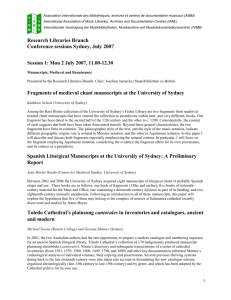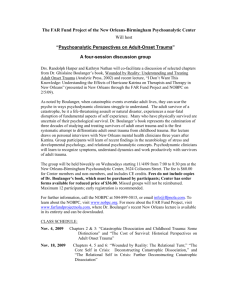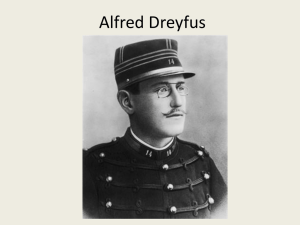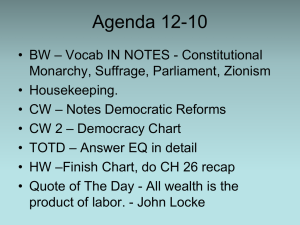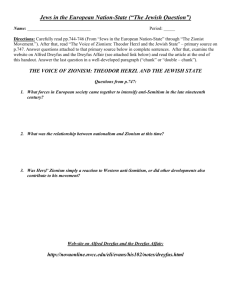France and the Great War - The Great War 1914-1918
advertisement
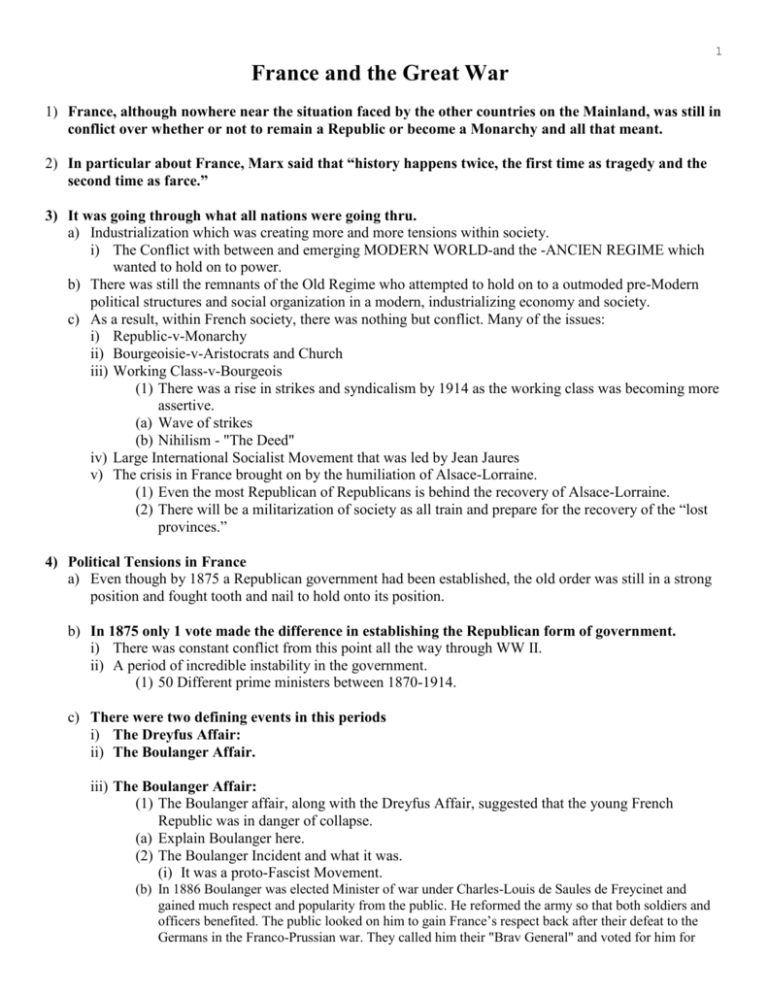
1 France and the Great War 1) France, although nowhere near the situation faced by the other countries on the Mainland, was still in conflict over whether or not to remain a Republic or become a Monarchy and all that meant. 2) In particular about France, Marx said that “history happens twice, the first time as tragedy and the second time as farce.” 3) It was going through what all nations were going thru. a) Industrialization which was creating more and more tensions within society. i) The Conflict with between and emerging MODERN WORLD-and the -ANCIEN REGIME which wanted to hold on to power. b) There was still the remnants of the Old Regime who attempted to hold on to a outmoded pre-Modern political structures and social organization in a modern, industrializing economy and society. c) As a result, within French society, there was nothing but conflict. Many of the issues: i) Republic-v-Monarchy ii) Bourgeoisie-v-Aristocrats and Church iii) Working Class-v-Bourgeois (1) There was a rise in strikes and syndicalism by 1914 as the working class was becoming more assertive. (a) Wave of strikes (b) Nihilism - "The Deed" iv) Large International Socialist Movement that was led by Jean Jaures v) The crisis in France brought on by the humiliation of Alsace-Lorraine. (1) Even the most Republican of Republicans is behind the recovery of Alsace-Lorraine. (2) There will be a militarization of society as all train and prepare for the recovery of the “lost provinces.” 4) Political Tensions in France a) Even though by 1875 a Republican government had been established, the old order was still in a strong position and fought tooth and nail to hold onto its position. b) In 1875 only 1 vote made the difference in establishing the Republican form of government. i) There was constant conflict from this point all the way through WW II. ii) A period of incredible instability in the government. (1) 50 Different prime ministers between 1870-1914. c) There were two defining events in this periods i) The Dreyfus Affair: ii) The Boulanger Affair. iii) The Boulanger Affair: (1) The Boulanger affair, along with the Dreyfus Affair, suggested that the young French Republic was in danger of collapse. (a) Explain Boulanger here. (2) The Boulanger Incident and what it was. (i) It was a proto-Fascist Movement. (b) In 1886 Boulanger was elected Minister of war under Charles-Louis de Saules de Freycinet and gained much respect and popularity from the public. He reformed the army so that both soldiers and officers benefited. The public looked on him to gain France’s respect back after their defeat to the Germans in the Franco-Prussian war. They called him their "Brav General" and voted for him for 2 (c) (d) (e) (f) Prime Minister when Rene Goblet retired from office in May 1887. Once again a man with more power disagreed with the fame that Boulanger was receiving. Maurice Rovier, a government official disliked Boulanger and had had aggression toward him for a long while; and Rovier refused to have Boulanger in his government. So the general was sent to command the XIII corps. While Boulanger was being pushed away by important politic officials, the public had high hopes for their "Brav General." Something came about known as the "Boulangist Movement," where Bonapartists supported him, and the Duchesse D’Uzes urged the Royalists to side with Boulanger. The Duchessse, (Marie Anne Clementine de Rochechouart-Mortemart), gave huge sums of money to Boulanger’s political fund. Of course with every supporter, there were just as many against him, and in 1888 Boulanger was punished for coming to Paris three times in disguise and without leave, and for going to see Prince Napoleon at Prangins in Switzerland. Boulanger was taken out of his commanding position and his name was taken off the army list. On the brighter side however, he was elected for deputy of the Nord right away. In June 1888 he wanted to revise the constitution, but was rejected again by the Chamber, so Boulanger resigned. Prime Minister Charles Floquet got into an argument with him that led to a duel where the general was injured severely. This was a huge humiliation to Boulanger, but his followers never failed to support him. All through 1888 his ideas and attitudes ruled French politics. An overwhelming majority wanted him as deputy of Paris in January 1889. His supporters yelled for him to take over the government as dictator. He didn’t accept this title, but instead went to the home of his mistress, Marguerite de Bonnemains. Boulanger’s failure to take the responsibility that he was elected for infuriated his followers and the new government. Pierre Tirard, along with Ernest Constans as Minister of the interior decided to try to prosecute the general. To everyone’s amazement Boulanger left Paris on April 1st to go to Brussels and then to London, at the peak of his power. The Senate tried him for treason, and on August 14, 1889 he was sentenced to deportation. At the elections of 1889 and 1890, support for him was fading fast. The public was no longer enthusiastic for whom they had previously called "General Revenche." Boulanger fled to Belgium to be with Maguerite, and he killed himself at her grave in the cemetery of Ixelles two months after her death. (i) The society was far too trusting of Boulanger. They stood behind him when he was defending their country, which is legitimate enough. He was held responsible for revenge of Germany, and the public looked up while government officials looked down on him. Perhaps the officials were jealous of how much attention Boulanger got from the public; and they were victorious when they watched him fall in the eyes of his fans. (3) The controversy involved critical institutions and issues, including monarchists and republicans, the political parties, the Catholic Church, the army, and strong anti-Semitic sentiment. iv) The Dreyfus case underscored and intensified bitter divisions within French politics and society. (1) The fact that it followed other scandals (2) Alfred Dreyfus, was an obscure captain in the French army, came from a Jewish family that had left its native Alsace for Paris when Germany annexed that province in 1871. v) Explain what happens. (1) In 1894 papers discovered in a wastebasket in the office of a German military attaché made it appear that a French military officer was providing secret information to the German government. (2) Dreyfus came under suspicion, probably because he was a Jew and also because he had access to the type of information that had been supplied to the German agent. (3) The army authorities declared that Dreyfus’ handwriting was similar to that on the papers. Despite his protestations of innocence he was found guilty of treason in a secret military courtmartial, during which he was denied the right to examine the evidence against him. (4) The army stripped him of his rank in a humiliating ceremony and shipped him off to [life imprisonment on] Devil’s Island, a penal colony located off the coast of South America. 3 (5) What are the real issues? (i) KEY: The political right, whose strength was steadily increasing, cited Dreyfus’ alleged espionage as further evidence of the failures of the Republic. Édouard Drumont’s rightwing newspaper La Libre Parole intensified its attacks on the Jews, portraying this incident as further evidence of Jewish treachery ? (ii) What will be the nature of France. Will it be a monarchy and represent the past or will it be a Republic and join the modern world. vi) Who would support Dreyfus? (1) Dreyfusards saw in the case a major issue, individual rights, trampled in the name of national security. (2) Radical Republicans (3) Socialists (4) Liberals/Humanitarians vii) Who was against him? (1) Among the anti-Dreyfusards were conservatives still opposed to the outcome of the French Revolution. (2) Monarchists (3) Clerics (4) Anti-Semites - explain (a) It points out the anti-Semitism of France (b) It is an attack against the W.C. and socialism because the old order associated the Jews with modernity and socialism. (5) Conservative MC and workmen and Farmers (a) Militarists – People who would have followed Boulanger (6) These were the people, the elites, not just in France, who depicted an “. . . ideal of sacrifice and abnegation and reinforcing the people’s certainty that they were an organic part of a threatened nation. (7) Some went so far that the Germans smelled differently viii) What is the Result? (1) Dreyfus was convicted in 1894. (2) He was released in 1897 when it was found that the documents used against him were forged by the military and it was discovered that it was a conspiracy to discredit and destroy the Republic. (3) He was totally cleared by 1905. (4) Deal with the Army in 1995 finally acknowledging Dreyfus’ innocence. (a) “In sometimes surprising ways, the long reach of France’s history still intrudes on the nation’s conscience. How else to explain the scene on Sept. 7 when 1,700 people, invited by France’s Central Consistory of Jews, turned out to hear General Jean-Louis Mourrut, head of the army’s historical service. The subject was Captain Alfred Dreyfus, who 101 years ago was sentenced by a military court to life imprisonment on notorious Devil’s Island on trumped-up charges that he was a spy for the Germans. Mourrut’s mission on this occasion was to acknowledge more than a century later, and for the first time publicly, that the French army had been wrong. (b) Perhaps only in France would such a belated admission by such a deeply conservative institution as the army still ring with meaning. For Jean Kahn, president of the Central Consistory of Jews, Mourrut’s words were considered a significant event: “The general said things before us that never had been said by a military man,” said Kahn. “That is, indisputably, progress.” Less impressed, the satirical weekly Le Canard Enchainé sarcastically wrote, “The army got it! Incredible! Dreyfus was innocent!” 4 d) So what happens to France? (1) Republic is strengthened. (2) 1901 the Church has restrictions placed on it. (3) 1905 the Union of Church and State is dissolved. (i) Ousby makes the point that there were many Conservative Catholics who viewed the Great War and the consequent suffering on the dissolving of the Church and State. e) This struggle did not end here. The old order fought to gain back its dominant position. This struggle was to play itself out during the period of the Vichy government during WW II. i) The old order in France used this period to roll back many of the gains of the Republic and make France into an "ordered" society again. f) However, that does not make things any better for France. There is still the instability of the system. The issue of “Revanchism” and “Imperialism”- are used as integrative forces to attempt to bind the nation, a nation broken into warring classes into a unified nation. i) Key: The Issue of French Humiliation and Revanchism (1) “Nobody in France could overlook the obvious fact that German victory and German Unification had occurred simultaneously, they had in fact been one.” (a) “So the new Germany made imposing its terms of peace its first major official act, just as Frances’s new government made swallowing them its first major official act. The place chosen for declaring the new Reich was every bit as resonant as its timing. King Wilhelm of Prussia was formerly exalted to Kaiser Wilhelm I at Versailles --- Louis XIV’s great stateroom in Louis XIV’s great palace. Revenge for the past was also a warning for the future.” g) From 1871, even for Republicans the issue of the recover of Alsace-Lorraine is a feature of politics, education, military planning and on and on. i) Emile Littre – a Republican despaired at what he saw happening to even Republicans like himself: (1) “How ruined are the noble and generous prospects that once lay before us! We who brought our children up in well-meaning respect for foreign peoples! We must change all that; we must bring up in defiance and hostility; we must teach them that military training is the first of their duties; we must instill in them constant readiness to kill and be killed. That is the only way to avoid the fate of Alsace-Lorraine, the saddest of misfortunes, the most poignant of sorrows.” ii) Coupled with this was the fear, like the British had of “The French Disease” characterized by: (1) Shrinking birthrate (2) “a weakened constitution.” (a) i.e. lack of strength and will to fight and live (b) Social Darwinism that the nation had to be revitalized. iii) So, for many the “élan vital,” or life force, became the theme or the duty for the nation in this period. (1) In other words, for many, war would be welcome to not only recover Alsace-Lorraine but to revitalize the nation. (2) The “Generation of 1914” that generation that viewed “action” as the be all and end all. (a) Ernest Pischari; (i) Son of Socialists, atheists and pacifists. (ii) Joins the French Foreign Legion (iii) Converted to Catholicism (iv) He saw War as a potential source of national regeneration and the replacing of scientific rationalism by Christian beliefs. (v) He wrote: 1. “We are certainly heading for great victories and I feel less inclined than ever to repent at having desired a war which was necessary for the honour and greatness of France.” iv) They would come to see the coming war in the terms that de Gaulle outlined in 1914 when he wrote: 5 (1) “What is this war but a war of extermination?” v) Or as Churchill, in September of 1914 wrote: (1) “This is no ordinary war, but a struggle between nations for life or death. It raises passions between races of the most terrible kind.” vi) To be a true Frenchman and belong to the country. (1) Get Alsace-Lorraine back. (2) Save France and revitalize it (3) Define the Nation and what it will be. (4) All will prepare for War and no one will be surprised in 1914 when it happens.
